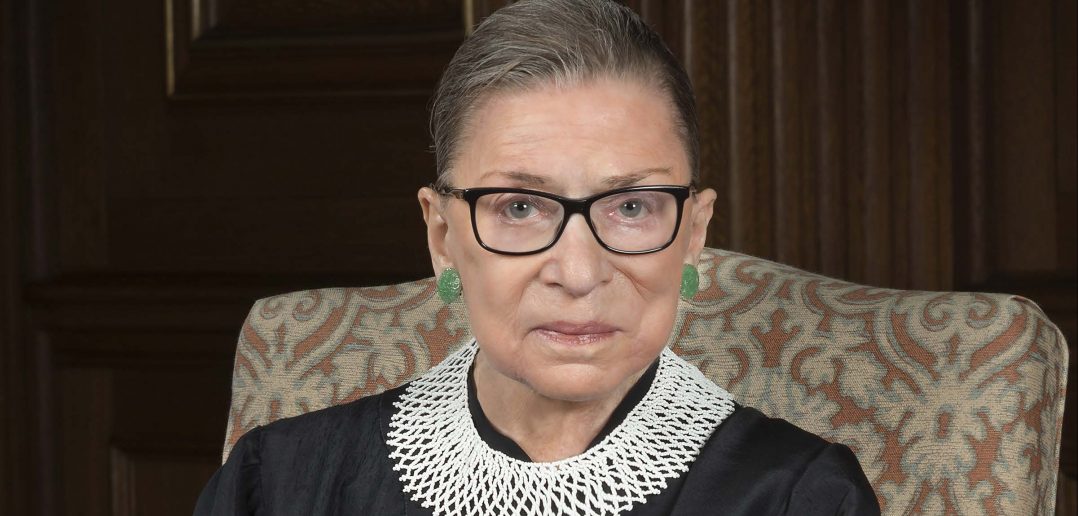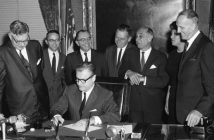
Ginsburg
When U.S. Supreme Court Justice Ruth Bader Ginsburg passed away on September 18 at age 87, she left a legacy of significant advancements for labor rights, women’s rights and civil rights through her steadfast defense of the law.
Ginsburg, who was often affectionately dubbed the “Notorious RBG” by generations of people who admired her, made great strides in ending gender and racial discrimination both in and out of the workplace. She also consistently fought for the rights of working people and the labor community as a whole.
“CSEA deeply mourns the loss of Justice Ruth Bader Ginsburg, who was an incredible champion of justice,” CSEA President Mary E. Sullivan said shortly after Ginsburg’s passing. “Her work in defending the law helped greatly advance civil rights, women’s rights and labor rights in this country.”
Paving the path
Even before was appointed to the Supreme Court in 1993, Ginsburg’s work helped change lives.
Despite being at the top of her class when she received her law degree from Columbia University in the late 1950s, she had difficulty finding employment due to her gender, even ironically being rejected for a U.S. Supreme Court clerkship. While she eventually clerked for a U.S. District Court Judge, Ginsburg taught law at her alma mater and Rutgers Law School.
While teaching at Rutgers in the early 1960s, Ginsburg discovered that her pay was lower than a male colleague, she joined a campaign to fight for equal pay. The school eventually substantially increased women’s wages.
That case led to Ginsburg handling more gender discrimination cases, many through the American Civil Liberties Union (ACLU).
One of her first notable cases, told in detail in the film “On the Basis of Sex,” involved a man who was never married and had hired a caregiver to care for his aging mother while he worked. He had filed a tax deduction relating to the care of dependents, but the IRS contended that he did not qualify for the deduction due to his gender and marital status.
Ginsburg, along with her husband, Martin Ginsburg, and ACLU lawyers, argued before the U.S. Court of Appeals for the Tenth Circuit that the denial was unconstitutional because the IRS was discriminating based on gender. The court agreed, holding that that discrimination on the basis of sex constitutes a violation of the Constitution’s Equal Protection Clause.
Ginsburg used this precedent and other later cases to overturn laws that discriminate on the basis of gender and race. In 1980, she was appointed to the U.S. Court of Appeals for the District of Columbia circuit, remaining there until her Supreme Court appointment.
A strong voice on the Court
As a Supreme Court Justice, Ginsburg continued her fight against discrimination. Notably, she delivered the majority opinion that ended gender exclusive admission policies at Virginia Military Institute and other single-gender colleges and universities.
A longtime advocate of LGBTQ rights, Ginsburg’s advocacy is credited with the Court’s decision to allow marriage equality throughout the United States.
Ginsburg wrote the Court’s dissent on Ledbetter v. Goodyear (2007), in which Lilly Ledbetter filed a lawsuit against the tire company alleging pay discrimination based on gender.
“The Court does not comprehend or is indifferent to the insidious way in which women can be victims of pay discrimination,” Ginsburg said in the dissent.
She urged Congress to take further action to end gender-based pay discrimination. That action resulted in the 2009 Lilly Ledbetter Fair Pay Act, which makes it easier for working people to file pay discrimination claims.
Ginsburg was also a steadfast supporter of working people, including siding with labor in Janus v. AFSCME Council 31.
In another 2018 dissent in a case in which the Court’s majority ruled that employers may forbid employees from banding together to fight wage and other workplace issues covered by arbitration agreements, Ginsburg called the decision “egregiously wrong.”
As this edition went to press, the U.S. Senate was holding confirmation hearings for Judge Amy Coney Barrett, who was nominated by President Donald Trump to replace Ginsburg.
Union members are committed to continuing Ginsburg’s work to secure justice for all people.
“The incredible legacy [Ginsburg] leaves behind must never be forgotten as we carry her memory with us while union members continue her fight to secure the rights for all people,” Sullivan said. “To say that America has lost someone amazing is a true understatement. On behalf of CSEA, I extend our deepest condolences to her family and loved ones.”



